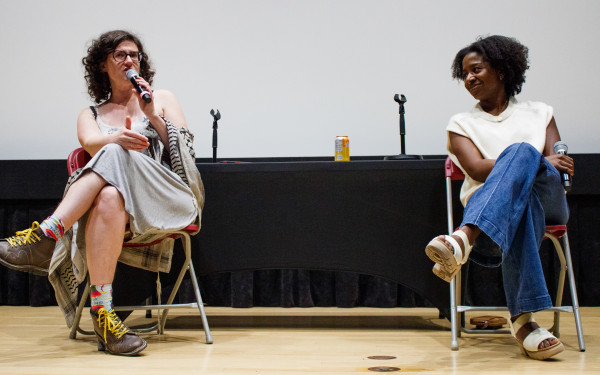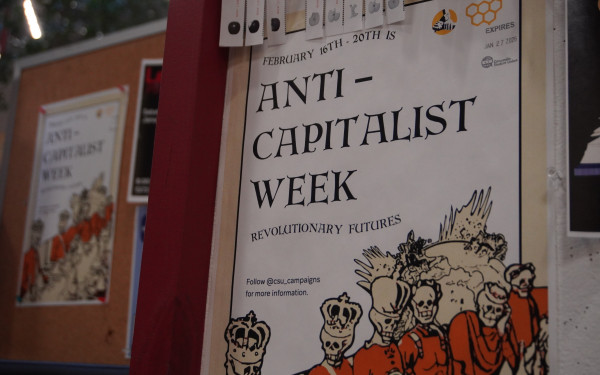Congress Is in Session
New Concordia Student Congress Seeks to Do Politics Differently
The Concordia Student Union council can come off as little more than a crash course in Robert’s Rules, making decisions that will take effect in a year or five.
To help open up the discussion to more than student politicians, the union is trying an experiment next week—the Concordia Student Congress.
The congress will look to provide an even playing field to student associations of all sizes—each with a single vote to pass non-binding resolutions to bolster political discourse on campus.
“That’s the goal, to reach out beyond the executive branch of the member associations, and reach the student membership itself,” said Terry Wilkings, a volunteer who is organizing the congress with CSU VP Academic and Advocacy Gene Morrow and President Melissa Kate Wheeler. “The goal is to bring many localized political units into one setting.”
Morrow got the idea for the congress while learning how other student governments work in the Fédération étudiante universitaire du Québec, the provincial student federation that the CSU is part of.
He saw other associations had mandates from their membership to lobby for at federation meetings—stances they could truly say were representative of their students.
“I’ve found that’s something that the CSU tends to be lacking,” said Morrow. “I thought that it would be really useful to try and get together a really representative body of Concordia students to try and figure out what these common positions [are] that the CSU could go out and defend authoritatively.”
Morrow says this could allow the union to then lobby for these causes both internally with the Concordia administration and externally with governments and other members of the FEUQ.
“If people want to pass a controversial, polarizing stance against something or for something, they can go through our normal electoral process. The purpose of this congress as a test is really to see what common ground we have.”—Gene Morrow, CSU VP Academic and Advocacy
The congress could also help mend the breakdown in communication between the grassroots, departmental level of student action and what gets the attention of the CSU.
“We’re very excited about it. I think it’s a great opportunity to reach out to others,” said Ned Zimmerman, president of the Concordia Association of Students in Theatre.
CAST, as a departmental association in the fine arts faculty, has not had elected representation on CSU council since 2012. No fine arts students have run for council in over a year.
Zimmerman says this congress will allow students to discuss common problems, such as budget cuts, which have led to more crowded classes and some course cancellations.
“The more ways that students can get involved in politics at the general undergraduate level the better,” said School of Community and Public Affairs Student Association executive secretary Lucinda Marshall-Kiparissis. “[The] congress is an initiative that the SCPASA can especially get behind, since we are a very small faculty, with a lot of involved, interested and vocal members.”
The congress also has the support of larger groups on campus; Arts and Science Federation of Associations President Paul Jerajian has been encouraging the federation’s member associations to attend its first meeting, which is taking place on March 6.
“It’s rare that you have a forum where the entire diverse student body gets together to discuss topics that are common amongst them,” said Jerajian.
A two-thirds majority is required for the congress to add a topic to the agenda. Ninety per cent must then vote in favour of a position for it to become the congress’ stance. If an entire faculty disapproves of a position, it will not be adopted regardless of whether the faculty holds less than 10 per cent of the votes.
Once the congress approves a stance, Wilkings hopes the position can be made official at individual council meetings.
“They could go back to their individual political units and see if in a more binding setting they can adopt the position,” he said. “That’s where I feel there’s a strong mobilizing agent, where you can get even more voices than the participants of the student congress.”
The real measure of success for the congress is if it manages to do politics differently at Concordia.
“If people want to pass a controversial, polarizing stance against something or for something, they can go through our normal electoral process,” said Morrow. “The purpose of this congress as a test is really to see what common ground we have and not get bogged down in the same discussions that tend to cycle around.”
The first meeting of the Concordia Student Congress is taking place March 6, from 3:30 p.m. to 8 p.m. Location T.B.A.
CORRECTION: The original version of this article stated, “A two-thirds majority is required for the congress to adopt a position.” In fact, a two-thirds majority is required for the congress to add a topic to the agenda. The Link regrets the error.

_900_600_90.jpg)





